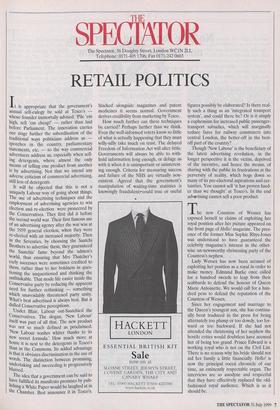The Spectator, 56 Doughty Street, London WC1N 2LL Telephone: 0171-405
1706; Fax 0171-242 0603
RETAIL POLITICS
It will be objected that this is not a uniquely Labour way of going about things. The use of advertising techniques and the employment of advertising agencies to win election and re-election were pioneered by the Conservatives. They first did it before the second world war. Their first famous use of an advertising agency after the war was at the 1959 general election, when they were re-elected with an increased majority. Then in the Seventies, by choosing the Saatchi Brothers to advertise them, they guaranteed the Saatchis' fame beyond the admen's World, thus ensuring that Mrs Thatcher's early successes were sometimes credited to them, rather than to her boldness in ques- tioning the unquestioned and thinking the unthinkable. That made life easier inside the Conservative party by reducing the apparent need for further rethinking — something which unavoidably threatened party unity. What's best advertised is always best. But it dulled Conservative perceptions. Under Blair, Labour out-Saatchied the Conservatives. The slogan, 'New Labour' itself was part of all that. The new product was not so much defined as proclaimed. New Labour washes whiter thanks to its new secret formula.' How much more at home it is next to the detergents in Tesco's than in the Commons. Its added advantage is that it obviates discrimination in the use of Words. The distinction between promising, undertaking and succeeding is progressively blurred.
The idea that a government can be said to have fulfilled its manifesto promises by pub- lishing a White Paper would be laughed at in the Chamber. Best announce it in Tesco's. Stacked alongside magazines and patent medicines it seems normal. Government derives credibility from marketing by Tesco.
How much further can these techniques be carried? Perhaps further than we think. Even the well-informed voters know so little of what is actually happening that they must willy-nilly take much on trust. The delayed Freedom of Information Act will alter little. Governments will always be able to with- hold information long enough, or deluge us with it when it is unimportant or uninterest- ing enough. Criteria for measuring success and failure of the NHS are virtually non- existent. Agreed that the government's manipulation of waiting-time statistics is knowingly fraudulent;-could true or useful figures possibly be elaborated? Is there real- ly such a thing as an 'integrated transport system', and could there be? Or is it simply a euphemism for increased public passenger- transport subsidies, which will marginally reduce fares for railway commuters into central London, the better-off in the best- off part of the country?
Though 'New Labour' is the beneficiary of the latest advertising revolution, in the longer perspective it is the victim, deprived of the incentive, and hence the means, of sharing with the public its frustrations at the perversity of reality, which bogs down so many of its pre-electoral aspirations and cer- tainties. You cannot sell 'it has proven hard- er than we thought' at Tesco's. In the end advertising cannot sell a poor product.
The new Countess of Wessex has exposed herself to claims of exploiting her royal position after her picture appeared on the front page of Hello! magazine. The pres- ence of the former Miss Sophie Rhys-Jones was understood to have guaranteed the celebrity magazine's interest in the other- wise un-newsworthy christening party of the Countess's nephew.
Lady Wessex has now been accused of exploiting her position as a royal in order to make money. Edmund Burke once called for a hundred swords to leap from their scabbards to defend the honour of Queen Marie Antoinette. We would call for a hun- dred pens to defend the reputation of the Countess of Wessex.
Since her engagement and marriage to the Queen's youngest son, she has continu- ally been traduced in the press for being alternately too plump or too dowdy, too for- ward or too backward. If she had not attended the christening of her nephew the hostile critics would doubtless have accused her of being too grand. Prince Edward is a working royal who is not on the Civil List. There is no reason why his bride should not aid her family a little financially. Hello! is now the principal social chronicle of our time, an eminently respectable organ. The interviews are so anodyne and respectful that they have effectively replaced the old- fashioned royal audience. Which is as it should be.


























































 Previous page
Previous page